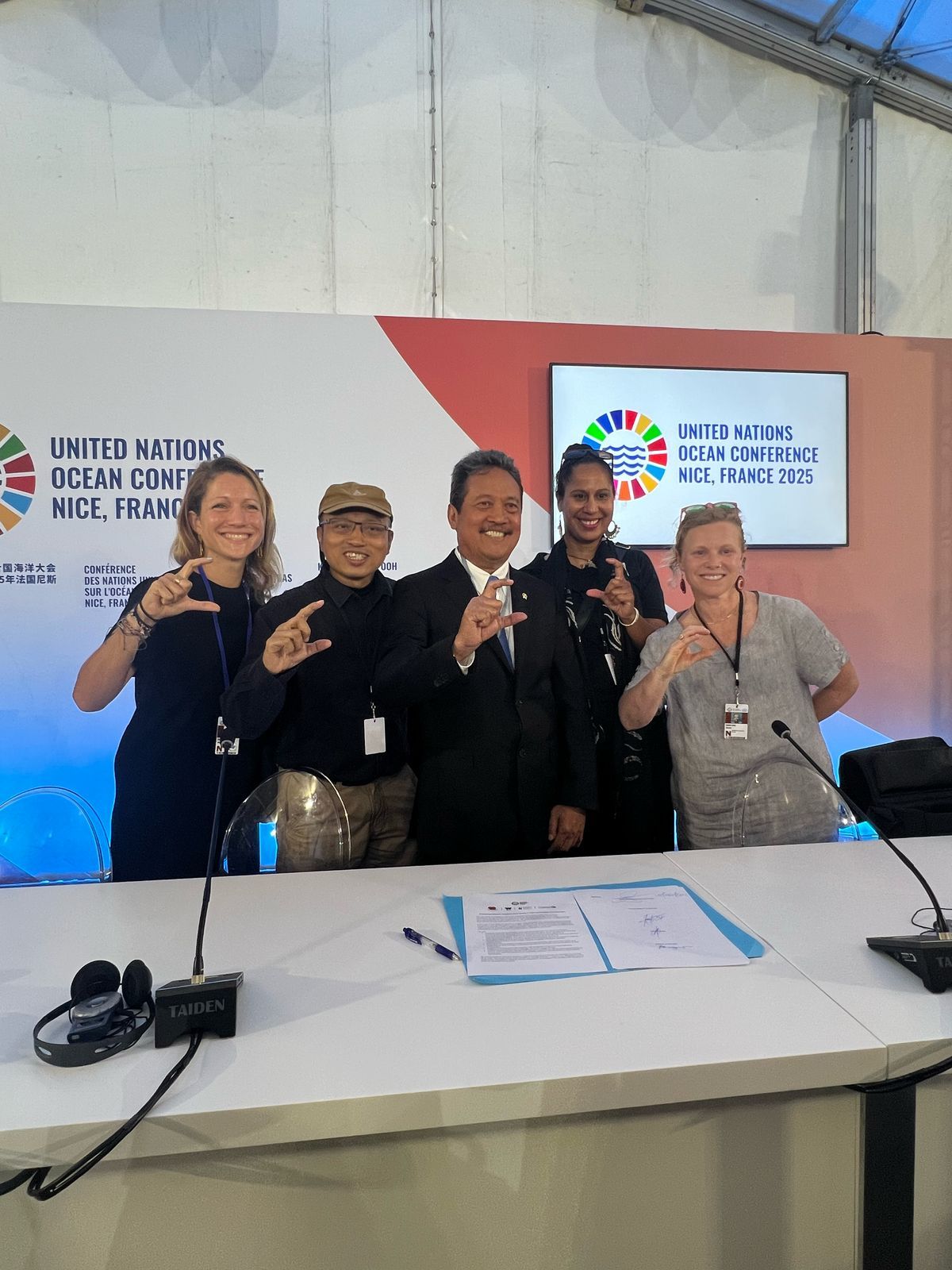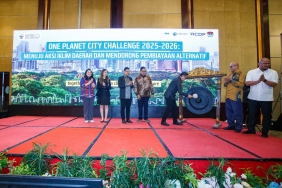INDONESIA'S BLUE DIPLOMACY AT THE WORLD OCEAN CONFERENCE (UNOC3): A GLOBAL EFFORT FOR SUSTAINABLE, CLIMATE-RESILIENT CORAL REEFS, FOR INDONESIA'S FUTURE
Nice, France. June 18, 2025 - The Government of Indonesia affirmed its commitment to global efforts to protect coral reefs that are resilient to climate change at the 3rd United Nations Ocean Conference (UNOC3), taking place June 9-13, 2025, in Nice, France.
The commitment was made at a high-level event titled "Protecting Climate-Resilient Coral Reefs: A High-Level Commitment", initiated by the Government of Papua New Guinea with global partners such as the Wildlife Conservation Society (WCS), The Nature Conservancy (TNC), WWF, and the Coral Reef Rescue Initiative (CRRI).
Indonesia is one of eleven countries to sign this commitment, alongside the Republic of Madagascar, the Republic of Palau, the Republic of Panama, the Solomon Islands, the United Republic of Tanzania, the Republic of Vanuatu, the Independent State of Papua New Guinea, the Commonwealth of the Bahamas, Belize, and the Republic of France. This collective commitment marks an important step in strengthening global collaboration for the protection of coral reef refugia areas that are resilient to climate change.
"Coral reefs are important ecosystems that support fisheries, tourism, and coastal protection. Indonesia has more than 51,000 km² of coral reefs and 14 of the world's 50 Bioclimate Units. This commitment is in line with national ocean protection and climate adaptation priorities," said Sakti Wahyu Trenggono, Minister of Marine Affairs and Fisheries of Indonesia.
Coral reef ecosystems also contribute significant economic value. In Indonesia, these ecosystem services are estimated to be worth around USD 3.3 billion per year, spanning large and small-scale fisheries and coral reef-based tourism. However, coral reefs are among the most vulnerable ecosystems to climate change impacts, such as increased sea temperatures, acidification, and pollution. Global scientific models project that more than 90% of the world's coral reefs will be degraded by 2050 if urgent and effective conservation measures are not taken.
"This global commitment brings together countries and organizations working to protect refugia - areas that have a higher chance of surviving climate impacts. Through partnerships, we are targeting the protection of key areas that reflect important biodiversity and local benefits," explained Rachel Sapery James, Coral Reef Rescue Initiative (CRRI) Lead.
Dr. Imam Musthofa Zainudin, as Director of Marine and Fisheries Program, WWF Indonesia Foundation, also said "Indonesia's coral reefs are globally important for the availability of fish to realize food security in Indonesia, including its biodiversity. But they are very vulnerable to the pressures of climate change. WWF-Indonesia supports the Government of Indonesia in the implementation of this initiative through close collaboration with local communities and other partners, with an adaptive, inclusive, and science-based conservation approach.
Indonesia's participation in this high-level commitment also reinforces the national policy direction that places marine conservation as an important pillar of sustainable development and food security. This commitment also supports the Blue Economy vision of the Ministry of Marine Affairs and Fisheries (KKP), particularly in expanding and improving the effectiveness of marine protected areas to cover 30% of national waters by 2045 (30x45 vision), and ensuring the protection of critical ecosystem functions in maintaining marine food security through scalable and sustainable fisheries practices.
Through optimal management of conservation areas, it is expected that environmentally friendly capture fisheries and aquaculture practices can continue to be improved, while contributing to the increase in state revenue from the fisheries sector in coastal and marine areas, which has currently reached Rp116 trillion (Source: PDSI KKP 2022).
Through the 30x45 vision, Indonesia targets effective management of conservation areas and Other Effective Area-based Conservation Measures (OECM), in line with the Kunming-Montreal Global Biodiversity framework. This commitment is a strategic step in bridging conservation needs with national agendas such as the blue economy, food security, and strengthening local wisdom.
In the UNOC3 forum, Indonesia also voiced the importance of global cooperation in capacity building, research, marine spatial planning, and technology transfer to accelerate the achievement of Sustainable Development Goal (SDG) 14. The Indonesian government successfully pushed for the recognition of the Asia-Pacific region's initiative on Ocean-Based Climate Action (OCA) and made it part of the international discourse.
Indonesia's presence at UNOC3 was led by the Minister of Marine Affairs and Fisheries. Present with him were the Chairman of Commission IV of the House of Representatives and the Deputy Minister of Foreign Affairs, along with other delegates, to emphasize Indonesia's position as an ocean champion who not only voices commitment, but also sets a real example in the protection of the global ocean.
**
Further information contact:
Karina Lestiarsi, Communication Officer WWF-Indonesia | 0852-1816-1683
About WWF Indonesia Foundation
WWF-Indonesia is a civil society organization with a local legal entity and a global network, supported by more than 100,000 supporters. Our mission is to stop the degradation of the Earth’s natural environment and to build a future in which humans live in harmony with nature by conserving the world's biological diversity, ensuring that the use of renewable natural resources is sustainable, and promoting the reduction of pollution and wasteful consumption.
For the latest news, visit www.wwf.id and follow us on X (Twitter) @WWF_id | Instagram @wwf_id | Facebook WWF-Indonesia | Youtube WWF-Indonesia




